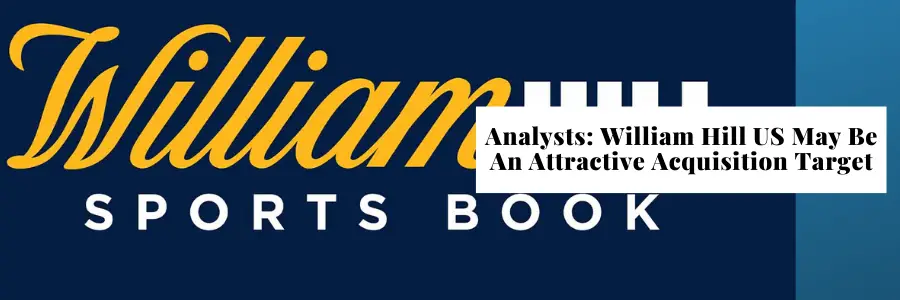Analysts: ‘Attractive’ William Hill US Could Be An Acquisition Target

A cash-strapped and struggling William Hill might seek either an outright or partial sale of its US business in order to right the ship in the face of continued debt pressures, according to recent analyst comment.
The team at Numis in London today pondered whether a sale of William Hill US might be on the cards considering it would be “attractive to acquirers.”
William Hill US achieved net revenue growth of 33% to $161.7m in 2019, although start-up costs for the various expansion states effectively wiped out operating profits of $34.8m from the Nevada business.
In a previous update, chief executive Ulrik Bengtsson boasted that William Hill’s US operations have “gone from strength to strength.” And indeed over the period, William Hill kickstarted its operations in additional states.
On top of this, William Hill also . CG Technology is the company behind the sportsbooks at various Las Vegas Strip casinos.
The deal, for an undisclosed sum, cemented William Hill as the number one operator in Nevada where, according to the trading statement, the business saw a 22% increase in revenue growth. That was achieved on a gross win margin that was slightly improved at 7.5%, up two basis points year-over-year.
William Hill forecasted – before the coronavirus crisis – EBITDA for the US business of circa £300m by 2022.
While the immediate future for sports betting in the USA is bleak, it appears to be much worse for the UK retail betting sector, where there’s no end in sight to the current closures.
The online business is in somewhat better shape, or at least in better shape optically, as the cancellation of sports also challenges it. According to Numis, William Hill is in danger of losing market share to competitors GVC, bet365 and Flutter Entertainment.
“Despite a 9% online market share in the UK, the brand is losing momentum,” the Numis team suggested yesterday. “The high management churn (including the CEO, CFO, and COO) also suggests the lackluster momentum vs. peers for its online division is unlikely to recover in the near term.”
A Certain Ratio
Then we come to the debt. According to Numis, short-term liquidity remains relatively healthy: William Hill has unrestricted cash on the balance sheet of £371m ($452m) and recently drew down £425m of a revolving credit facility meaning it has plenty of headroom given its estimated monthly cash burn of £20m.
However, leverage covenants on its debt might be more of an issue. A recent note from Moody’s Investor Services estimated that William Hill’s net debt to EBITDA ratio would balloon out to six times due to the crisis compared to its current covenant of 3.5 times.
William Hill’s worrying exposures:
- 40% of group revenue comes from UK land-based betting and gaming
- 50% of group revenue is from sports-betting
- 76% of group revenue comes from the UK
- A £203m bond is repayable in June
UK and Retail Focus are William Hill’s Fundamental Issues
Simon French, an analyst at Canaccord Genuity, also said recently that the COVID crisis had laid bare the weaknesses of William Hill.
“Fundamentally, what this crisis has shown is William Hill is still too oriented towards UK and retail with too much debt,” he told clients.
He added that the cash flow from retail “can no longer be relied upon” to service the debt.
Further, it’s unclear if William Hill will be able to utilize the UK government’s furlough scheme for its retail staff. The toxic atmosphere surrounding gambling at this present time makes what should be a simple case much more problematic – and the £203m debt repayment looms large.
Like other companies, William Hill has moved to suspend its shareholder dividend and said in a mid-March trading statement that it was “working closely” with the banks to “enhance (its) liquidity position.”
“One way to raise funds in the short term may be to divest part of its equity stake in William Hill US,” French added. “Given the look-through valuations for US-focused peers such as DraftKings and FanDuel, this may be a viable option with the least dilution for shareholders.”
But Who’s Buying?
DraftKings hopes to get its $3.3bn float away this week despite the current lockdown. At the same time, the merger of Flutter Entertainment and the Stars Group also received final approval this week, a deal that will bring Flutter’s FanDuel and Stars’ part-owned FOX Bet (update – FOX Bet has since closed) under one corporate roof.
The attractiveness of William Hill US right now is, as much as the rest of the sector, under a COVID-19 cloud. But as Numis pointed out, the company’s target EBITDA of $300m by 2022 was optimistic even before the crisis hit.
More uncertainty comes from the state of the a deal which, according to reports, is somewhat stranded on the rocks of the current lockdown.
William Hill US stands to potentially benefit from the deal given its existing arrangement with Eldorado, and that company’s 20% stake in William Hill US. Should the transaction proceed, William Hill US will potentially run retail and online operations out of the acquired Caesars Sportsbook properties.
However, there are a lot of maybes involved there, certainly enough to make any buyout or buying of a significant stake in William Hill at the very least contingent on events.
Scott Longley has been a journalist since the early noughties covering personal finance, sport and the gambling industry. He has worked for a number of publications including Investor’s Week, Bloomberg Money, Football First, EGR and GamblingCompliance.com. He now writes for online and print titles across a wide range of sectors.







